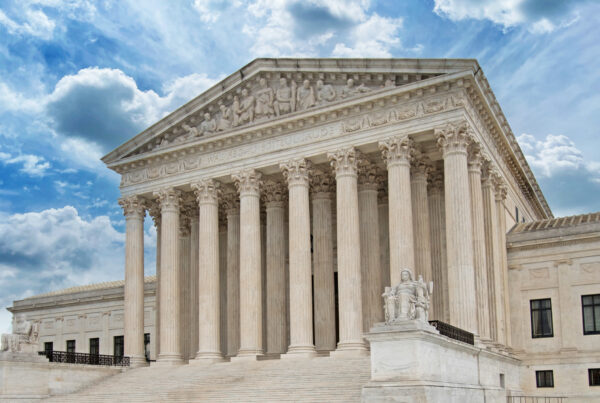Negotiations from within the halls of Congress regarding the Infrastructure Investment and Jobs Act (Infrastructure Bill or the Bill) have caused outcries from the cryptocurrency community. Despite the furor, the bill was signed into law by President Joe Biden on November 15, 2021. In this article, we will be taking a closer look at the broker issues in the historical context and evaluate what the impact may be going forward.
What is the subject of debate?
The controversy revolves around §6045 of the Internal Revenue Code (IRC) titled “Returns of brokers”, and no this is not the name for another Disney Star Wars title. “Returns of brokers” is not new, and it is responsible for a good portion of the 1099 forms you may receive in the months following the close of the year. Historically, brokers have been entities (individuals or businesses) who, in the ordinary course of their business, facilitated sales on behalf of others. Typically, this included a host of intermediaries such as stockbrokers. The regulations are open-ended regarding what constitutes reportable transactions. Specified securities are the most common and include shares of stock, notes, bonds, commodities, derivatives, futures contracts, and other financial instruments. Brokers are required to report the dollar value of the transaction as proceeds and in some cases may also report the cost basis.
It is important to note that the receipt of a 1099 does not necessarily constitute a taxable event, it simply draws attention to a transaction for further consideration. There is a myriad of scenarios where an individual may receive a 1099 where the underlying transaction may not constitute a taxable event. These events include, a 1099-K received from PayPal for regular money transfers between family and friends, or a 1099-S for the sale of a home that qualifies for primary home exclusion.
What did the Infrastructure Bill change?
The Bill has added and changed a few short passages which have now pulled cryptographic assets into the reporting regime. The two important ones are:
- The definition of a broker is expanded to include “any person who (for consideration) is responsible for regularly providing any service, and effectuating transfers of digital assets on behalf of another person.”
- The list of covered securities is expanded to include “any digital asset”. Digital asset is defined as “any digital representation of value which is recorded on a cryptographically secured distributed ledger or any similar technology as specified by the Secretary.”
The use of “any” within the definition of digital assets suggests a very open and inclusive interpretation of assets subject to the reporting regime. This point is emphasized by the addition of any similar technology as specified by the Secretary.
The broker definition is a bit more open-ended. The key terms here revolve around the concepts of “regularly providing any service” and “for consideration”. This set of terminology appears in the definitions of other types of brokers and is typically the point on which the Internal Revenue Service (IRS) and Taxpayers disagree on.
What does this mean?
Prior to the Infrastructure Bill, the IRS had a vague argument that §6045 was applicable to cryptocurrency exchanges. However, no voluntary compliance took place, and the issue was not enforced. With the passage of the Bill, the 1099 reporting requirements are now explicitly spelled out. Once the rules go into effect individuals can expect to receive a 1099 from their cryptocurrency exchange/broker in the same way they receive one from their stockbroker.
Why is this important?
By IRS estimates, income tax compliance for blockchain assets has been incredibly low. In 2021, the IRS Office of Fraud Enforcement has unveiled “Operation Hidden Treasure” to seek out non-compliance. The IRS cannot add, subtract, or modify language in the IRC to aid compliance and enforcement; changes must originate in Congress. The Infrastructure Bill represents the first legislative modification of the IRC relating to “digital assets”. All prior guidance on the treatment of digital assets originated from the IRS in various notices and communications based on their interpretation of the existing IRC. Income tax compliance for digital assets is now in the spotlight, and the IRS has Congressional support in seeking out “hidden treasures”.
The far-reaching implications of these new rules extend beyond the obvious reporting requirements on centralized crypto exchanges. There are many questions as to how the rules will be applied and enforced in situations that are unique to digital assets. Digital assets include, decentralized exchanges, atomic swaps, decentralized autonomous organizations, etc. As traditional broker rules have been applied to corporations that had regularly redeemed their stock or lenders that regularly issue and retire their own notes. It is likely that the rules will be applied to organizations that utilize digital representations of stock or debt. As such, issuers that capitalize their business through token sales (whether equity or debt) may be subject to the broker reporting requirements.
When do the rules come into play?
Mandatory reporting requirements do not kick in until 2023. Most recipients will therefore begin receiving 1099 forms under the application of the legislative changes brought forth by the Bill in the early months of 2024. However, we encourage issuers to begin preparations leading up to 2023 as proactive data collection will be crucial for compliance.
What’s next?
The IRS has already received some additional tools to aid in compliance with digital asset transactions, and “Operation Hidden Treasure” is unlikely to wind down in the short term. Additional legislative changes to the IRC are likely and the Build Back Better bill proposed several other changes relating to digital assets. While the Build Back Better bill is currently dead in the water, the revenue-raising provisions related to digital assets are likely to resurface again.
Please contact your WG advisor if you have any questions or need clarification about your digital asset activity.





